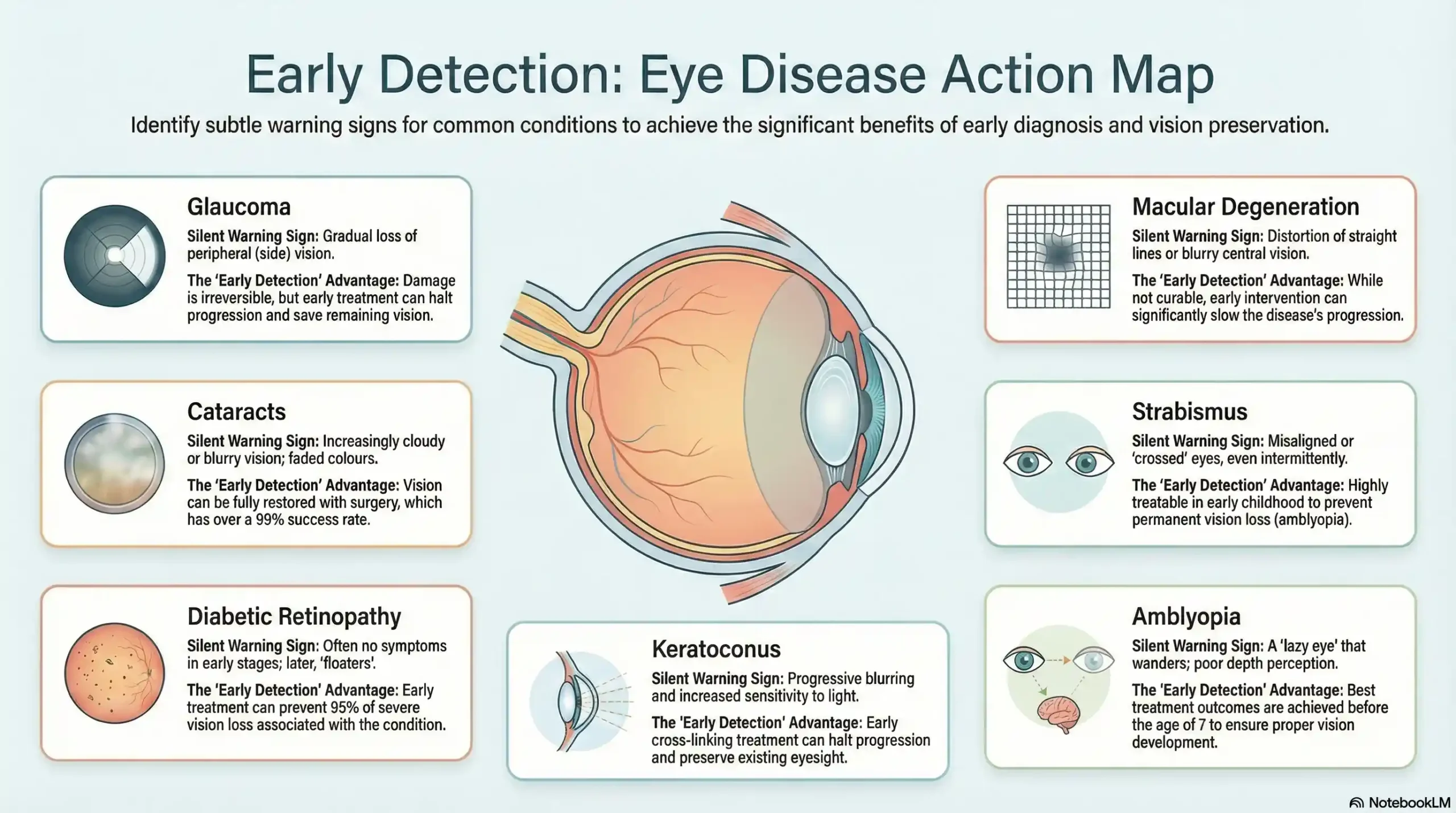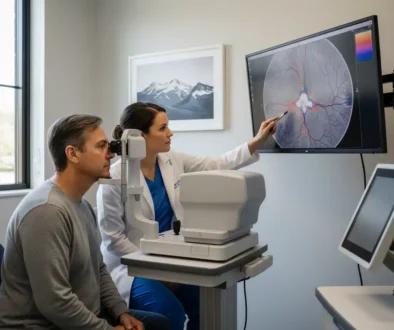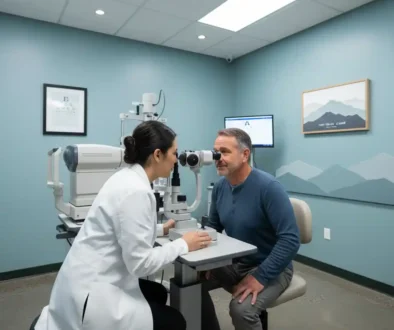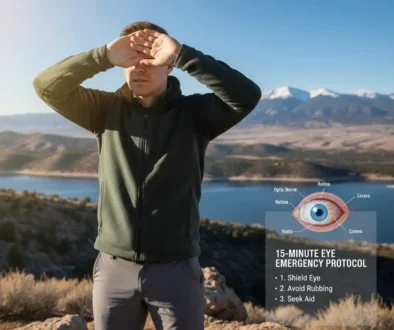7 Eye Diseases an Eye Exam Can Detect
Key Takeaways: Fort Collins Eye Health Essentials
Stay ahead of vision issues with these critical insights from local optometry experts:
-
Annual eye exams are non-negotiable in Fort Collins—especially with altitude, UV exposure, and active lifestyles increasing risk for vision issues at all ages.

-
Early detection saves sight: Conditions like glaucoma, diabetic retinopathy, and keratoconus often show no early symptoms but are 90%+ manageable when caught through routine screening.
-
Children need early and consistent exams: Vision conditions like amblyopia and strabismus respond best before age 7, safeguarding both learning and development.
-
High UV and altitude amplify risks: Fort Collins residents benefit from tailored protective solutions—UV-blocking lenses, altitude-aware monitoring, and outdoor-friendly corrective options.
-
Cutting-edge care is local: Fort Collins offers same-day referrals, advanced imaging, and minimally invasive procedures—ensuring comprehensive care close to home.
1. Common Refractive Errors Detected in Fort Collins Eye Exams
Comprehensive eye exams in Fort Collins, CO identify four key refractive errors impacting vision clarity:
- Myopia (nearsightedness): Close objects appear clear, but distant ones blurry. Cause:Elongated eyeball shape misdirects light away from the retina.
- Hyperopia (farsightedness): Distant objects remain sharp while nearby items blur. Cause: Shortened eyeball or irregular cornea curvature.
- Astigmatism: Blurred vision at all distances due to uneven corneal/lens curves. This hereditary condition requires early detection—especially in children.
- Presbyopia: Age-related farsightedness emerging in your 40s, progressing through your 60s. Easily managed with reading glasses or contacts.
Why Fort Collins Families Prioritize Annual Exams:
Local optometrists emphasize proactive care because:
✦ 90% of childhood astigmatism cases are treatable when caught early
✦ Presbyopia management prevents daily frustrations like eye strain
✦ Custom corrective solutions adapt to Northern Colorado lifestyles
2. Glaucoma Detection: Silent Threat to Fort Collins Vision
While primarily affecting adults over 60, Glaucoma can rarely occur in children. This group of diseases damages the optic nerve—your eye’s critical link to the brain. Fort Collins optometrists use advanced tonometry testing during comprehensive exams to catch it before symptoms manifest.
Key Glaucoma Indicators:
- Gradual peripheral vision loss (often unnoticed)
- Blurred vision or “halos” around lights
- Severe cases: Eye redness, pain, or nausea
Why Early Detection in Fort Collins Matters:
✦ 90% of vision loss is preventable with timely intervention
✦ Non-surgical treatments like medicated eye drops effectively manage early-stage glaucoma
✦ Annual exams track Northern Colorado’s high-altitude risk factors (increased IOP susceptibility)
3. Cataracts: Fort Collins’ Leading Age-Related Vision Solution
Affecting 50%+ of Americans over 80, cataracts cause gradual lens clouding that blurs vision and creates light halos. Fort Collins eye exams detect early-stage cataracts years before symptoms disrupt daily life—critical in Colorado’s high-UV environment that accelerates lens damage.
Why Local Detection Matters:
✦ 97% surgery success rates with artificial lens implants
✦ 15-minute outpatient procedures at Fort Collins surgical centers
✦ Personalized lens options for mountain driving, reading, or outdoor activities
Fort Collins Prevention Advantage:
Northern Colorado residents benefit from:
- Annual dilation tracking subtle changes
- UV-protective lens recommendations
- Co-managed care between optometrists and cataract surgeons
4. Retinal Conditions: Fort Collins’ Early Warning System
Dilated eye exams in Fort Collins, CO detect critical retinal diseases often linked to systemic health issues. Local retina specialists use advanced imaging to identify:
Diabetic Retinopathy
- Cause:Diabetes damages retinal blood vessels
- Risk:Leading blindness cause for adults
- Fort Collins Protocol:Annual dilated exams for all diabetics – 90% of vision loss preventable with early detection
Macular Degeneration
- Effect: Central vision loss (not full blindness)
- High-Risk Groups:Smokers ∙ Hypertension ∙ Age 50+
- Local Advantage:Colorado-specific UV protection plans slow progression
Retinal Detachment
- Emergency Signs:Sudden floaters or flashes
- Action Required:Immediate treatment at Fort Collins retinal centers
- Prevention:Routine exams detect weak retinal areas before detachment
Why Northern Colorado Patients Trust Annual Exams:
✦ Same-day referrals to retinal surgeons
✦ Diabetes-eye health coordination with PCPs
✦ Altitude-adjusted monitoring for vascular changes
5. Strabismus: Fort Collins’ Pediatric Alignment Specialists
Commonly called “crossed eyes,” strabismus involves eye misalignment from nerve damage or muscle dysfunction.
Fort Collins pediatric optometrists identify two primary types during children’s exams:
- Esotropia: Inward-turning eye
- Exotropia: Outward-turning eye
Early Intervention Advantages in Northern Colorado:
✦ Non-surgical success: 70% of cases corrected with prism glasses or vision therapy
✦ Surgical precision: Local ophthalmologists perform minimally invasive muscle adjustments
✦ Developmental protection: Prevents amblyopia (lazy eye) when treated before age 6
Why Fort Collins Families Act Quickly:
Colorado’s high-altitude activities increase eye strain risks—making annual children’s exams essential for:
- Tracking binocular vision development
- Detecting trauma-related misalignment early
- Customizing treatment for outdoor lifestyles
6. Amblyopia: Fort Collins’ Critical Childhood Window
Commonly called “lazy eye,” amblyopia occurs when underdeveloped brain-eye connections cause misalignment and poor depth perception. Unlike strabismus (muscle-based), this childhood condition requires early Fort Collins intervention:
Fort Collins Treatment Advantages:
✦ 95% success rate when treated before age 7
✦ Pain-free options: Prescription eye patches • Medicated drops • Corrective lenses
✦ Depth-perception restoration: Vital for Colorado’s outdoor activities like hiking and skiing
Why Northern Colorado Parents Prioritize Screening:
Local pediatric optometrists recommend:
- Annual exams start at 6 months(American Optometric Association guidelines)
- 3D vision testsdetecting subtle depth perception issues
- Custom therapy plansaccommodating school/sports schedules
7. Keratoconus: Fort Collins’ Teen Vision Priority
This progressive condition thins and bulges the cornea into a cone shape, causing:
- Blurred vision even with correction
- Severe light sensitivity (especially Colorado’s high-altitude glare)
- Distorted night vision
Critical Fort Collins Insights:
✦ 90% of cases managed without surgery using:
∙ Custom rigid contact lenses
∙ Corneal cross-linking (CXL) to stabilize progression
✦ Peak onset: Puberty through early 20s
✦ Local urgency: Northern Colorado’s UV exposure accelerates thinning
Why Fort Collins Parents Schedule Teen Exams:
- Early detectionduring growth spurts prevents vision loss
- Advanced mappingat local clinics tracks subtle corneal changes
- Scleral lens specialistscustomize solutions for active lifestyles
This progressive condition thins and bulges the cornea into a cone shape, causing:
- Blurred vision even with correction
- Severe light sensitivity (especially Colorado’s high-altitude glare)
- Distorted night vision
Critical Fort Collins Insights:
✦ 90% of cases managed without surgery using:
∙ Custom rigid contact lenses
∙ Corneal cross-linking (CXL) to stabilize progression
✦ Peak onset: Puberty through early 20s
✦ Local urgency: Northern Colorado’s UV exposure accelerates thinning
Why Fort Collins Parents Schedule Teen Exams:
- Early detectionduring growth spurts prevents vision loss
- Advanced mappingat local clinics tracks subtle corneal changes
- Scleral lens specialistscustomize solutions for active lifestyles

Clear vision is more than just seeing 20/20—it’s about detecting hidden risks before they affect your quality of life. Whether you’re managing age-related changes, monitoring your child’s development, or staying ahead of silent threats like glaucoma, annual eye exams in Fort Collins offer proactive protection tailored to your lifestyle and environment.
Schedule your comprehensive eye exam today with a trusted Fort Collins optometrist—because early detection is the key to lifelong vision health.
FAQs
-
What eye diseases can an eye exam detect?
Eye exams can detect glaucoma, cataracts, macular degeneration, diabetic retinopathy, dry eye syndrome, and other conditions affecting eye health
-
How can an eye exam detect glaucoma early?
-
Why is early detection of macular degeneration important?
-
What does an eye exam reveal about diabetic retinopathy?
-
How can an eye exam diagnose cataracts?
-
Can an eye exam detect dry eye syndrome?
-
Who should get regular eye exams to check for these diseases?
-
At what age should I start getting regular eye exams?
-
Are there any symptoms of these eye diseases I should watch for?
-
How can I prevent eye diseases?
-
Does insurance cover eye exams for detecting these diseases?
-
What happens if an eye disease is detected during my exam?
Dr. Eric Torgerson
Owner at Poudre Valley Eyecare
Dr. Eric Torgerson is the owner of Poudre Valley Eyecare, and has been recognized for his contributions to optometry and his commitment to community health through various roles and accolades within the Northern Colorado Optometric Society and the Colorado Optometric Association.
Why Choose Us?
Our advanced technology and individualized care deliver results for patients of all ages. Our routine exams allow us to spot changes in your vision and allow us to treat those changes early. We have a comprehensive understanding of eye care, which means we can treat a wide range of conditions and chronic diseases. Our in-depth routine exams and customized treatment plans set us apart from the rest.


Please note: None of the above should be considered medical advice. If you’re having any concerns about your vision, please reach out to us immediately or see your primary care provider.




